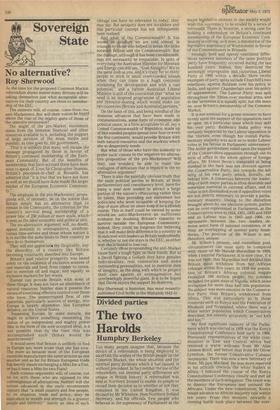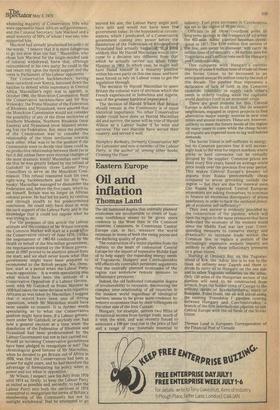Divided parties
The two Harolds
Humphry Berkeley
Too many people imagine that, because the device of a referendum is being employed to ascertain the wishes of the British people on the Common Market, the whole situation and the internal party divisions which it has caused, is without precedent. In fact neither the use of the referendum, not internal party differences are unique in British history. A referendum was held in Northern Ireland to enable its people to record their decision as to whether or not they remained in the United Kingdom. It was devised by Mr Whitelaw, then Northern Ireland Secretary, and his officials. Few people who believed in the supremacy of Parliament as the major legislative element in our society would wish this supremacy to be eroded by a series of referenda. There is, however, a strong case for holding a referendum on Britain's continued membership of the European Economic Community involving, as it does, a diminution of the legislative supremacy of Westminster in favour of the Commissioners in Brussels.
Strongly held and openly ventilated differences between members of the same political party have frequently occurred during the last hundred years. Indeed, they destroyed the seemingly impregnable and victorious Liberal Party of 1906 within a decade. More recent examples of party splits include Churchill's two rebellions, against Baldwin over his policy in India, and against Chamberlain over his policy of appeasement. The Labour Party was split throughout the 'fifties over nuclear arms, and in the 'seventies it is equally split, but nbt more so, over Britain's membership of the Common Market.
It is not unusual for a prime minister to have to rely upon the support of the opposition, tacit or open, on a particular issue which may split his own party. Baldwin's India policy was certainly supported by the Labour opposition in the 'thirties, even though his overall Parlia.mentary majority was such as to make Labour votes in his favour in Parliament unnecessary. The Attlee government relied upon the support. of the Conservative opposition through out its term of office in the whole sphere of foreign affairs. Mr Ernest Bevin's complaint at being stabbed in the back was not directed against the Conservative Party, but towards the left wing of his own party which, literally, sat behind him. A consensus between the leadership of both major parties is often desirable and sometime essential in external affairs, and its value is not diminished even if opposition votes are not strictly necessary to provide a parliamentary majority. Owing to the distortion brought about by our electoral system, parties can be over-represented in Parliament-, as the Conservatives were in 1924,1931,1935 and 1959 and as Labour was in 1945 and 1966. An agreement between the two leaders denotes some form of national consensus, or at least an overlapping of normal party boundaries. The position of Mr Wilson is not, therefore, unique.
Mr Wilson's present, and immediate past, circumstances can most aptly be compared with those of Mr Harold Macmillan in 1959, when I entered Parliament. It is now clear, if it was not then, that Macmillan had decided that Britain must withdraw from her African colonies within five years. In 1959 the population of Britain's African colonial empire exceeded 100 million people. Its colonies included the giant state of Nigeria, which alone accounted for more than half this population. No subject was more emotive in the Conservative Party than Britain's withdrawal from Africa. This was particularly so in those countries such as Kenya and the Federation of Rhodesia and Nyasaland, where there was a white settler population which Conservatives described, not entirely accurately, as "our kith and kin."
My first significant memory of the Parliament which was elected in 1959 was the Kenya Constitutional Conference held early in 1960. Previously representatives of the white communities in East and Central Africa had received a warm welcome from Mr Alan Lennox-Boyd, and before that from Mr Oliver Lyttelton, the former Conservative Colonial Secretaries. There was now a new Secretary of State, Mr lain Macleod. He was more reserved in his attitude towards the white leaders in Africa. I followed the course of the Kenya Constitutional Conference closely and met all the members of each delegation. The result was to dismay the Europeans and astound the Africans. Under the new constitution. Kenya would advance to African majority rule within ten years. From this moment onwards a running battle took place between the over whelming majority of Conservative MPs who were opposed to black African self government, and the Colonial Secretary, lain Macleod and a small minority of MPs, of whom I was one, who supported him. Macleod had already proclaimed his policy in the words, "I believe that it is more dangerous to go too slow than too fast." Macmillan, who chose Lain Macleod for the single-minded task of colonial withdrawal, knew that, although outnumbered in his own party, he could in the last resort rely upon the moral support and the votes in Parliament of his Labour opponents.
The Conservative backbenchers, having been outwitted over Kenya, battened down the hatches to defend white supremacy in Central Africa. Macmillan's reply was to appoint, in October 1960, the Monckton Commission. Both the Conservative backbenchers and Sir Roy Welensky, the Prime Minister of the Federation of Rhodesia and Nyasaland, were assured that the Monckton Commission would not consider the possibility of any of the three territories of Southern Rhodesia, Northern Rhodesia (now Zambia) and Nyasaland (now Malawi) seceding frm the Federation. But, since the purpose of the Commission was to consider the relationship of the three territories towards each other, what was to be the position if the Commission were to decide that there could be no productive relationship between them (as in fact it did, unless there were internal changes of the most dramatic kind)? Macmillan once told me that he was greatly helped by the refusal of Gaitskell to appoint three Labour Privy Councillors to serve on the Monckton Commission. This refusal reassured both his own right-wing backbenchers and Sir Roy Welensky. Macmillan managed to dismember the Federation and, before the five Years, which he set himself, Britain was no longer an African colonial power. He had led his party by caution and through stealth to his predetermined conclusion. He could only have done so with the tacit support of the Labour Party and in the knowledge that it could not oppose what he was trying to do.
For the purposes of this article the Labour attitude and the conduct of Mr Wilson towards the Common Market will start at a point after the Conservative victory of June 1970. Unlike the negotiations of 1962-63 conducted by Mr Heath on behalf of the Macmillan government, the negotiations started by the Wilson government in 1967 proved to be abortive almost-from the start, and we shall never know what that government might have been prepared to recommend to the British people. We, therefore, start at a period when the Labour Party was in opposition. It is worth speculating also what would have been the attitude of a Conservative Opposition if a Labour Government with Mr Gaitskell as Prime Minister in 1959 had taken the same decision with regard to Africans as was taken by Macmillan. I suggest that it would have been one of strong opposition, which Mr Macmillan would have been unable to control. It is further worth speculating as to what the Conservative position might have been, if a Labour government under Mr Gaitskell, or anybody else, had heldgeneral election at a time when the dissoution of the Federation of Rhodesia and Nyasaland had been predetermined by the Labour Government but not in fact carried out. Would an incoming Conservative government have been pledged to renegotiate or not? The chronological good-fortune of Mr Macmillan, when he decided to get Britain out of Africa in 1959, was that the Conservatives had been in power for eight years, and he had therefore the advantage of formulating his policy when in power and not when in opposition.
Mr Wilson, I suspect, saw his duty from 1970 until 1974 as, firstly, to keep the Labour Party as united as possible and, secondly, to take the Labour Party into both the elections of 1974 committed to renegotiate the terms of Britain's membership of the Community but not to Outright withdrawal. Had he attempted to go
beyond his aim, the Labour Party might well have split and would not have been the" government today. In the hypothetical circumstances, which I predicated, of a Conservative government coming into power before the dissolution of the Federationof Rhodesia and Nyasaland had actually happened, it is most unlikely that Mr Harold Macmillan would have come to a decision any different from that which he actually carried out when Prime Minister in 1963. In which case, he might well have found himself in a minority position within his own party on this one issue, and have been forced to rely on Labour votes to get the legislation through.
The decision by Harold Macmillan to spare Britain the colonial wars of attrition which the French experienced in Indochina and Algeria, was of the greatest historical importance.
The decision of Harold Wilson that Britain should remain in the Community is of equal historical importance. No other Conservative leader could have done as Harold Macmillan did and survive, the same will be true of Harold Wilson as a Labour leader if he wins and survives. The two Harolds have served their country, and served it well.
Hum phry Berkeley, formerly Conservative MP for Lancaster and now a member of the Labour Party, is the author of, among other books, Crossing the Floor



































 Previous page
Previous page